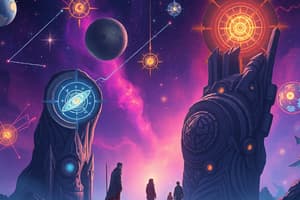Podcast
Questions and Answers
What is the primary focus of formal logic?
What is the primary focus of formal logic?
- The study of moral values
- The form and structure of arguments (correct)
- Everyday reasoning and argumentation
- Analyzing the structure of arguments
Which logical operator is true if at least one statement is true?
Which logical operator is true if at least one statement is true?
- IMPLIES
- NOT
- AND
- OR (correct)
What does the Socratic method emphasize in philosophical discussions?
What does the Socratic method emphasize in philosophical discussions?
- Formal logical analysis
- Engaging in dialogue to stimulate critical thinking (correct)
- Providing answers to questions
- Historical context and subjective experience
Which philosopher is known for the Theory of Forms?
Which philosopher is known for the Theory of Forms?
What is an example of an informal fallacy?
What is an example of an informal fallacy?
Which branch of philosophy investigates the nature of knowledge?
Which branch of philosophy investigates the nature of knowledge?
Which logical fallacy misrepresents an argument to make it easier to attack?
Which logical fallacy misrepresents an argument to make it easier to attack?
What key philosophical question addresses the rights and wrongs of actions?
What key philosophical question addresses the rights and wrongs of actions?
Flashcards are hidden until you start studying
Study Notes
Logic
-
Definition: Study of reasoning and argument structure; distinguishes valid from invalid reasoning.
-
Types of Logic:
- Formal Logic: Focuses on form and structure; includes propositional logic and predicate logic.
- Informal Logic: Studies everyday reasoning and argumentation; emphasizes fallacies and practical reasoning.
-
Components:
- Premise: Statement offering support or evidence.
- Conclusion: Statement derived from premises.
-
Logical Operators:
- AND: Conjunction; true if both statements are true.
- OR: Disjunction; true if at least one statement is true.
- NOT: Negation; inverts the truth value of a statement.
-
Fallacies: Logic errors in reasoning.
- Ad Hominem: Attacks the person instead of the argument.
- Straw Man: Misrepresents an argument to make it easier to attack.
- Appeal to Ignorance: Claims something is true because it hasn't been proven false.
Philosophy
-
Definition: Study of fundamental questions about existence, knowledge, values, reason, and reality.
-
Branches:
- Metaphysics: Explores the nature of reality and existence.
- Epistemology: Investigates the nature of knowledge and belief.
- Ethics: Examines moral values and principles.
- Logic: Analyzes the structure of arguments.
- Aesthetics: Studies beauty and art.
-
Major Philosophical Questions:
- What is the nature of existence?
- How do we know what we know?
- What makes actions right or wrong?
- What is the best way to live?
-
Key Philosophers:
- Socrates: Emphasized questioning and dialogue.
- Plato: Proposed Theory of Forms; ideals of truth and beauty.
- Aristotle: Founded formal logic; categorized knowledge.
- Immanuel Kant: Explored the limits of human understanding and morality.
- Friedrich Nietzsche: Critiqued traditional moral values and the concept of truth.
-
Philosophical Method:
- Socratic Method: Engaging in dialogue to stimulate critical thinking.
- Analytic Philosophy: Focuses on clarity and logical analysis.
- Continental Philosophy: Emphasizes subjective experience and historical context.
Logic
- Definition: Logic is the study of reasoning and argument structure. It differentiates valid reasoning from invalid reasoning.
- Types of Logic:
- Formal Logic: This type focuses on the form and structure of reasoning, utilizing systems like propositional logic and predicate logic.
- Informal Logic: This type examines everyday reasoning and argumentation, including the identification of fallacies and practical reasoning.
- Key Components:
- Premise: A statement that provides support or evidence for a conclusion.
- Conclusion: A statement derived from the premises.
- Logical Operators: These connect and modify statements:
- AND (Conjunction): True only if both statements are true.
- OR (Disjunction): True if at least one statement is true.
- NOT (Negation): Inverts the truth value of a statement.
- Fallacies: These are errors in logical reasoning:
- Ad Hominem Fallacy: Attacks the person making the argument instead of addressing the argument itself.
- Straw Man Fallacy: Misrepresents an opponent's argument to make it easier to attack.
- Appeal to Ignorance Fallacy: Claims something is true because it hasn't been proven false.
Philosophy
- Definition: Philosophy delves into fundamental questions about existence, knowledge, values, reason, and reality.
- Branches of Philosophy:
- Metaphysics: Explores the nature of reality and existence, asking questions like "What is the nature of time?" or "What is the relationship between mind and body?"
- Epistemology: Investigates the nature of knowledge and belief, exploring how we know what we know and the reliability of our senses.
- Ethics: Examines moral values and principles, focusing on what constitutes right and wrong actions, and the foundation of morality.
- Aesthetics: Studies the nature of beauty and art, investigating what makes something beautiful, and exploring artistic experiences.
- Key Philosophical Questions:
- What is the nature of existence?
- How do we know what we know?
- What makes actions right or wrong?
- What is the best way to live?
- Notable Philosophers:
- Socrates: Highlighted questioning and dialogue as tools for seeking wisdom.
- Plato: Developed the Theory of Forms, proposing that true reality lies in ideal forms or concepts.
- Aristotle: Founded formal logic and categorized knowledge with a focus on observation and empirical reasoning.
- Immanuel Kant: Explored the limits of human understanding and morality, emphasizing the role of reason in shaping experience.
- Friedrich Nietzsche: Critiqued traditional moral values and the concept of truth, emphasizing power and individual will.
- Philosophical Methods:
- Socratic Method: A method of inquiry involving rigorous questioning and analysis to achieve understanding.
- Analytic Philosophy: Emphasizes clarity and logical analysis in examining philosophical concepts.
- Continental Philosophy: Focuses on subjective experience and historical context, exploring themes like consciousness, existentialism, and phenomenology.
Studying That Suits You
Use AI to generate personalized quizzes and flashcards to suit your learning preferences.




